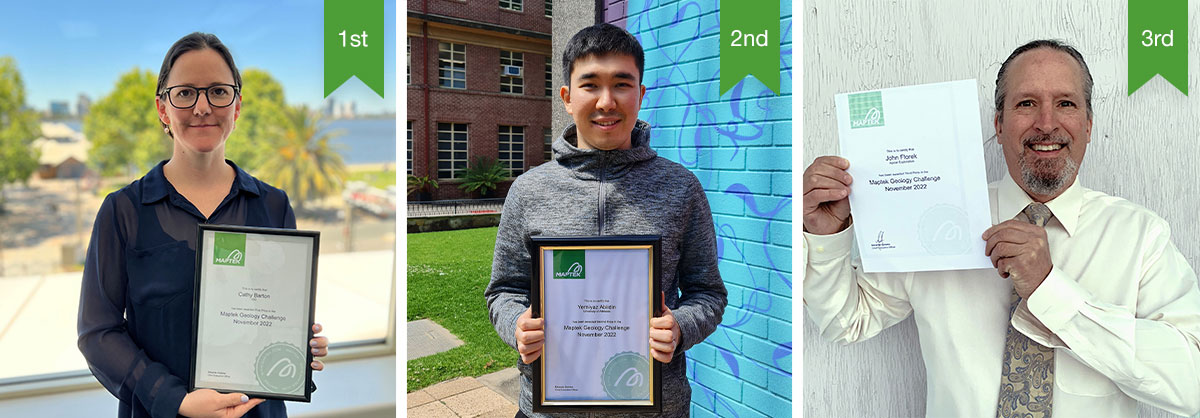December 2022 Issue Index
Geology champions win on innovation
Creating alternative geological models to better understand water-bearing structures on a disseminated nickel deposit has won the 2022 Maptek Geology Challenge.
IGO Senior Resource Geologist Cathy Barton had been intrigued that she and a geology colleague interpreted alternative orientations for pegmatite intrusions despite working on the same data. She also hoped to gain insights into the uncertainty of the location and thickness of the pegmatites.
Barton, who won a batch of DomainMCF hours for her company alongside a personal prize, said finding a simple solution in DomainMCF made it practical to produce alternatives quickly, boosting confidence in existing models and highlighting areas needing review.
Barton described her data as ‘distressingly real’, comprising 1885 diamond holes drilled from surface and underground in widely varying orientations and directions by multiple owners over 30 years. Spacing ranged from 100 m with no sign of economic mineralisation to 15 m in some mineralised areas.
‘It was easier getting started in the software than I thought it would be, even though I had not used Vulcan GeologyCore before. DomainMCF was very easy to use,’ Barton said.
With domains categorised and data validated, the job was submitted to DomainMCF using the lithological grouping as the domain and six elements to estimate grade trends.
In 30 minutes and 45 seconds DomainMCF produced an alternative geological model that honoured the drilling data and correlated well with the implicit model.
Barton appreciated that DomainMCF can be used as a validation tool for geological modelling, for example, highlighting areas where a vein model may be incorrect due to the modeller’s interpretation of the orientation. She also noted that DomainMCF helped in modelling intricate isoclinal folding as well as large regional faults.
Barton plans to use the DomainMCF machine learning hours to help review several different resources.
Innovative applications
Yerniyaz Abildin, University of Adelaide postgraduate researcher won second prize for a study that compared explicit, implicit and geostatistical modelling with the machine learning approach.
Abildin noted the main advantages to be the ‘stunning’ speed of cloud computing and user-friendly domaining tools.
‘DomainMCF produced the result extremely fast – the run time exceeded my expectations by around ten times,’ Abildin said.
‘The interconnection between Maptek products is beneficial. It is easy to open the block model produced by DomainMCF in Vulcan and then analyse the results against previous models,’ he added.
Third prize was awarded to John Florek, Principal of Apical Exploration, who ran DomainMCF on a series of diamond drillholes for a high-grade gold deposit, to see whether incorporating different geological trends and categorising them as a domain variable gives more geological control over the model.
‘The Maptek solution allowed a fresh new perspective to the deposit that we will be exploring. Trends that were not identified, revealed themselves,’ Florek commented.
The performance of DomainMCF and Vulcan GeologyCore surprised Florek also.
‘The time it takes to do these sophisticated models was amazing. It would take geologists years to develop comparable models, Florek said.
Florek commented favourably on the ability to model domains with known structural controls for mineralisation, noting that it allowed him to create several models, and test them during exploration drilling.
Additional benefits for projects include quick evaluation of known deposits without the bias of earlier workers.
‘I could independently evaluate whether a property has higher or lower potential than what is being promoted. It’s a great tool for institutional investors,’ Florek said.
Maptek Senior Technical Lead Richard Jackson was impressed with the breadth of applications from entrants this year.
‘The three winning submissions are great examples of how DomainMCF can be applied to very different problems, all gaining a little more insight into their data and adding value to the vastly different problems being tackled. It truly was a challenge of more than just domains!’ Jackson said.
- Model processing times and user-friendliness of data preparation tools exceeded expectations for all winning entries in the 2022 Geology Challenge
- Winning entry demonstrated that machine learning could quickly produce valid, alternative models for a disseminated nickel deposit
- DomainMCF boosts confidence in existing geological models, and highlights areas where review or additional drilling may be indicated

